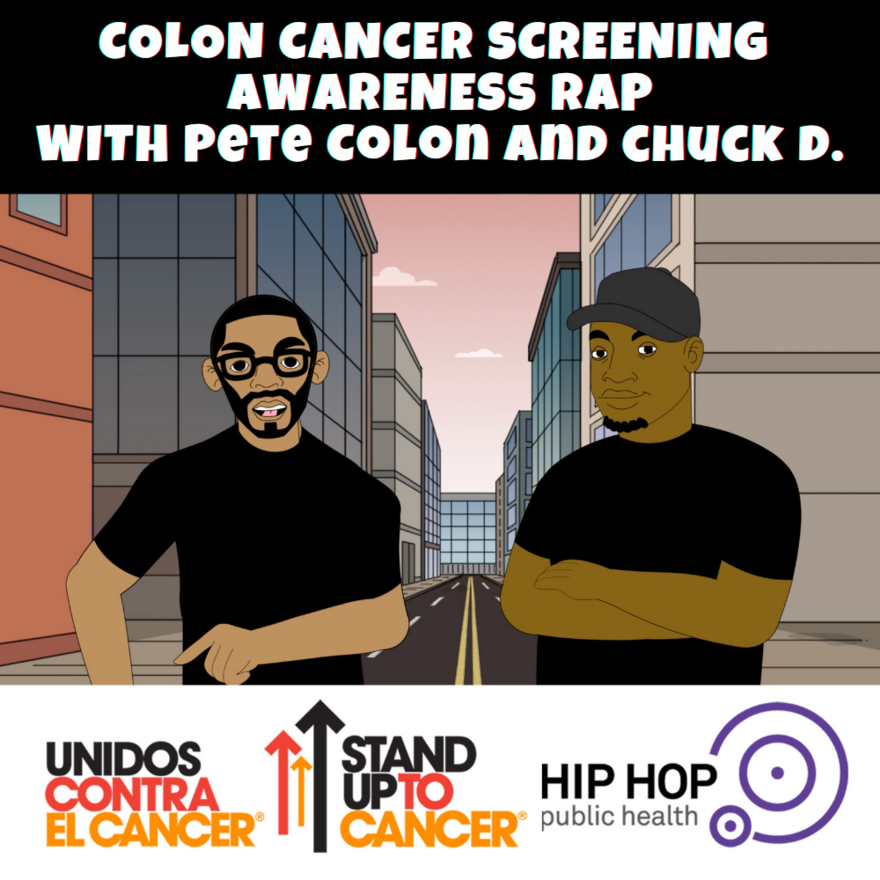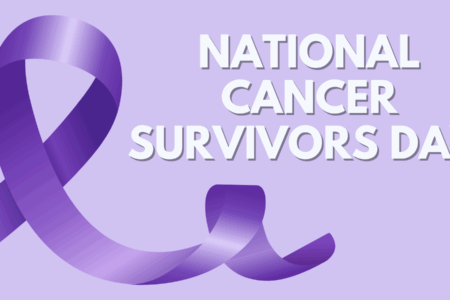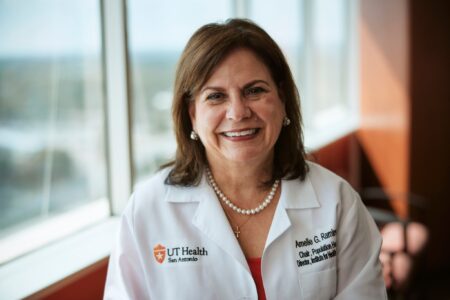Share On Social!
Hip hop artist Chuck D, one of the founding members of Public Enemy, once urged people of color to “Fight the Power.”
Now he’s urging them to fight cancer.
Chuck D wants people to “check your behind” and get screened for colon cancer as part of a new public service announcement (PSA) from Stand Up to Cancer / Unidos Contra El Cancer, a charitable fundraiser for cancer research. DJ and poet Pete Colon sings the same musical message in a Spanish-language PSA.
In another PSA video, actress Uzo Abuda urges people of color to join clinical trials.
“Hip-hop has a powerful voice and we’re using it to help make the community better, to try to get people to pay attention, to stay healthy and to catch things early instead of reading about it when it’s too late,” said Chuck D in a news release.
New Bilingual PSAs on Latinos and Colon Cancer Screening
Stand Up to Cancer / Unidos Contra El Cancer partnered with Hip Hop Public Health, a health equity organization, to produce the two animated music videos — one in English, the other in Spanish.
In the English version, Chuck D performs an original rap song to emphasize early detection through cancer screening.
“Get tested, pay attention to the signs. Talk to your doctor and check your behind,” Chuck D raps in the video.
The song, released in 30-second and 60-second versions, also promotes cutting back on risk factors like smoking, alcohol and unhealthy food.
 The rap encourages people to talk about colon cancer with close ones. It reassures them “screening is protective and it won’t hurt you.”
The rap encourages people to talk about colon cancer with close ones. It reassures them “screening is protective and it won’t hurt you.”
It focuses on people 45 and over, urging take a home test or talk to their doctor.
Colorectal cancer screening rates are lowest among Latinos, with 59% getting screened compared to 66% of Black people and 69% of white people. Latino adults are more likely than white adults to be diagnosed at a later stage of colon cancer.
“It’s about reaching the communities and utilizing different methods of communication that will resonate and shift [people’s] behaviors,” said Sung Poblete, CEO at Stand Up to Cancer, according to Campaign US. “We need trusted message makers within [those] communit[ies].”
Advocates and experts say campaigns like these can make a big difference.
“That’s the power of a message in music—these songs actually address questions in a direct, relevant way that takes some of the trepidation out of it,” Dr. Olajide Williams, a Columbia University neurology professor who founded Hip Hop Public Health said.
New PSA on Clinical Trial Participation for Latinos, Other People of Color
The other new Stand Up to Cancer / Unidos Contra El Cancer PSA features actress Uzo Aduba, of “Orange Is the New Black” and “In Treatment,” who lost her mother to pancreatic cancer.
In the video, Aduba encourages cancer patients in communities of color to share their stories and health information to accelerate and diversify cancer research.
“Cancer research requires bold and innovative thinking,” she said. “Patients can help accelerate research by sharing their information and their unique experience. You may be able to play a part in accelerating cancer research and new breakthroughs.
Clinical trials are studies to find more effective treatments, which can help current cancer patients, and achieve a better understanding of breast cancer to help future survivors.
“The PSA features breast cancer survivor Bridgette and five-time cancer thriver Joel sharing their own experience,” according to PR Week.
For osteosarcoma survivor Maeve, participating in a clinical trial will go to help those who come after her.
Sincer her diagnosis when she was a teenager, Maeve has become an advocate for patients like her. As an amputee, she says this work is important.
“As an Osteosarcoma survivor, my biggest hope for the next generation is kinder treatments,” she said.
How Can You Get Involved in a Cancer Clinical Trial?
We need Latino volunteers for clinical trials because it helps researchers create treatments and solutions tailored for this population.
Take it from Alma Lopez.
Lopez believes participating in a clinical trial at UT Health San Antonio helped her get better treatment and better long-term health in her survivorship journey.
“Clinical trials are great for finding new treatments that help people,” Lopez said. “And it helps the scientists. It gives opportunity to better medication for all populations.”
Dr. Amelie Ramirez, leader of Salud America! at UT Health San Antonio, is creating new ways to encourage Latinos to volunteer and is supported by a grant from Genentech, a member of the Roche Group.

“Latinos in clinical trials are not only helping themselves, they’re building a future with better treatments that can help their families and communities in the future,” Ramirez said.
If you’re in San Antonio, volunteer for:
- A cancer clinical trial at the Mays Cancer Center at UT Health San Antonio
- An Alzheimer’s disease clinical trial at the Glenn Biggs Institute for Alzheimer’s and Neurodegenerative Diseases at UT Health San Antonio
- The AHEAD Trial. For people ages 55-80, this trial aims to protect against the onset of Alzheimer’s disease, giving you the chance to contribute to healthier futures for your mom, dad, and and other family members.
- The REACH Trial. For people ages 55-89 with a diagnosis of mild cognitive impairment or Alzheimer’s disease, this trial aims evaluate a new treatment that aims to slow the effects of the disease.
You can also use the National Cancer Institute’s online search tool or call 1-800-4-CANCER to find a cancer clinical trial in your area!
By The Numbers
142
Percent
Expected rise in Latino cancer cases in coming years



